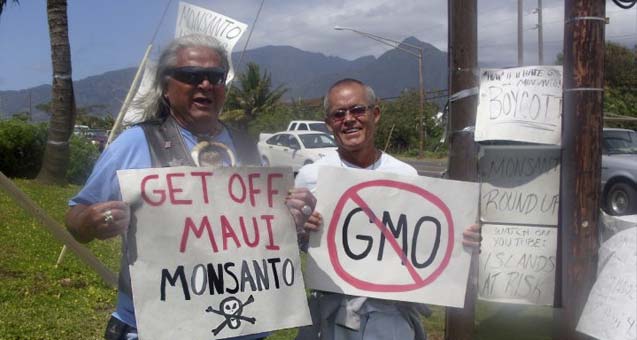
What do same-sex marriage and genetically engineered soybeans have in common? The correct answer is nothing. But big agribusiness corporations are banking on a federal judge in Hawaii to make the connection.
Hawaii is a beautiful setting for weddings and honeymoons, for both locals and visitors from all over the world. And as of December 2013, it celebrates same-sex marriages – 20 years after its State Supreme Court became the first in the nation to see a problem with denying marriage to same-sex couples.
But Hawaii has also become a test bed for multinational agribusiness corporations eager to try out new pesticides and new genetically engineered organisms, such as new variants of soybeans and corn. Many people in Hawaii are concerned about the effects of all these pesticides and genetically modified organisms. Not everyone cares. But people are asking questions, and last year, the local government on the scenic island of Kaua’i passed a law requiring major commercial agricultural companies to tell the public what pesticides and genetically modified organisms they’re using on the island.
Now lawyers for these global agribusinesses are asking a federal judge in Hawaii to throw out the Kaua’i law. And – this is the crazy part – they’re comparing it to laws against gays and lesbians.
In 1996, in a case called Romer v. Evans, the Supreme Court struck down a Colorado constitutional amendment that had prevented state and local agencies from providing antidiscrimination protections to gays and lesbians. In that decision, Justice Kennedy found that the Colorado law violated the Constitution’s equal protection clause, which says that no state may “deny equal protection of the laws to any person.” Justice Kennedy drew on past discrimination cases to explain that the Constitution doesn’t allow laws that are motivated by “a bare . . . desire to harm a politically unpopular group.”
Justice Kennedy’s decision in 1996 laid the groundwork for the recent wave of decisions striking down bans on same-sex marriage. While not everyone supports same-sex marriage, a growing majority of Americans recognize that, however they personally might feel about it, the government shouldn’t discriminate against people based on their sexual orientation.
So what does this have to do with global seed corporations? The correct answer is “absolutely nothing.” But these companies claim that the Kaua’i law requiring them to disclose what they’re releasing into the environment violates their rights under the equal protection clause. And, amazingly, they’re citing Romer v. Evans as precedent. But not just Romer – they’re also citing cases involving discrimination against the mentally handicapped, and children of undocumented immigrants. (The companies cite these cases at page 40 of their summary judgment memorandum, which is not posted on the internet, but is available upon request.)
People can disagree about the right way to manage genetically engineered foods and pesticides. But when the votes are cast and the law is the law, global agribusinesses shouldn’t be able to run to a judge and claim that they’ve been discriminated against. And it’s ridiculous for them to compare themselves to gays and lesbians. They’re not a minority group; they’re major international business enterprises that already enjoy too much influence over our political process.
So when you hear wedding bells, smile as you think of the happy couple and their friends and family. Not big seed companies. Because the equal protection clause is about treating each other with equality and dignity, and it cheapens and dilutes the hard-won freedoms of gay and lesbian Americans for global corporations to invoke their achievements in a case about genetically engineered soybeans.
Join us in defending the truth before it’s too late
The future of independent journalism is uncertain, and the consequences of losing it are too grave to ignore. To ensure Truthout remains safe, strong, and free, we need to raise $47,000 in the next 8 days. Every dollar raised goes directly toward the costs of producing news you can trust.
Please give what you can — because by supporting us with a tax-deductible donation, you’re not just preserving a source of news, you’re helping to safeguard what’s left of our democracy.